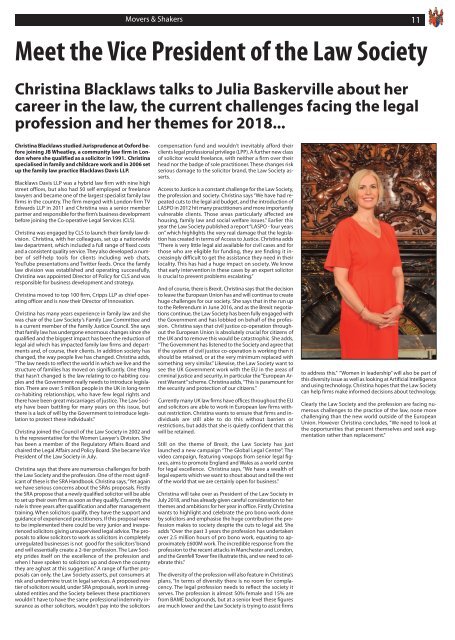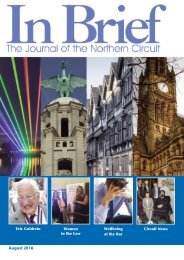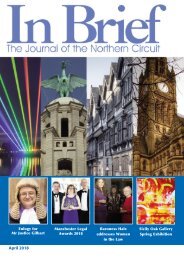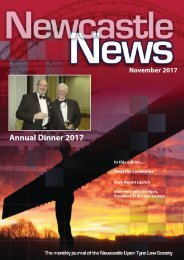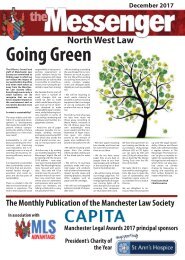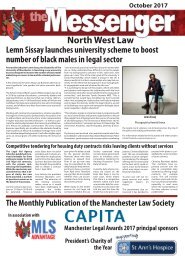Messenger November 2017
You also want an ePaper? Increase the reach of your titles
YUMPU automatically turns print PDFs into web optimized ePapers that Google loves.
Movers & Shakers 11<br />
Meet the Vice President of the Law Society<br />
Christina Blacklaws talks to Julia Baskerville about her<br />
career in the law, the current challenges facing the legal<br />
profession and her themes for 2018...<br />
Christina Blacklaws studied Jurisprudence at Oxford before<br />
joining JB Wheatley, a community law firm in London<br />
where she qualified as a solicitor in 1991. Christina<br />
specialised in family and childcare work and in 2006 set<br />
up the family law practice Blacklaws Davis LLP.<br />
Blacklaws Davis LLP was a hybrid law firm with nine high<br />
street offices, but also had 50 self employed or freelance<br />
lawyers and became one of the largest specialist family law<br />
firms in the country. The firm merged with London-firm TV<br />
Edwards LLP in 2011 and Christina was a senior member<br />
partner and responsible for the firm’s business development<br />
before joining the Co-operative Legal Services (CLS).<br />
Christina was engaged by CLS to launch their family law division.<br />
Christina, with her colleagues, set up a nationwide<br />
law department, which included a full range of fixed costs<br />
and a consistent quality service. They also developed a number<br />
of self-help tools for clients including web chats,<br />
YouTube presentations and Twitter feeds. Once the family<br />
law division was established and operating successfully,<br />
Christina was appointed Director of Policy for CLS and was<br />
responsible for business development and strategy.<br />
Christina moved to top 100 firm, Cripps LLP as chief operating<br />
officer and is now their Director of Innovation.<br />
Christina has many years experience in family law and she<br />
was chair of the Law Society’s Family Law Committee and<br />
is a current member of the Family Justice Council. She says<br />
that family law has undergone enormous changes since she<br />
qualified and the biggest impact has been the reduction of<br />
legal aid which has impacted family law firms and departments<br />
and, of course, their clients. In addition society has<br />
changed, the way people live has changed. Christina adds,<br />
“The law needs to reflect the world in which we live and the<br />
structure of families has moved on significantly. One thing<br />
that hasn’t changed is the law relating to co-habiting couples<br />
and the Government really needs to introduce legislation.<br />
There are over 5 million people in the UK in long-term<br />
co-habiting relationships, who have few legal rights and<br />
there have been great miscarriages of justice. The Law Society<br />
have been battling for many years on this issue, but<br />
there is a lack of will by the Government to introduce legislation<br />
to protect these individuals.”<br />
Christina joined the Council of the Law Society in 2002 and<br />
is the representative for the Women Lawyer’s Division. She<br />
has been a member of the Regulatory Affairs Board and<br />
chaired the Legal Affairs and Policy Board. She became Vice<br />
President of the Law Society in July.<br />
Christina says that there are numerous challenges for both<br />
the Law Society and the profession. One of the most significant<br />
of these is the SRA Handbook. Christina says, “Yet again<br />
we have serious concerns about the SRAs proposals. Firstly<br />
the SRA propose that a newly qualified solicitor will be able<br />
to set up their own firm as soon as they qualify. Currently the<br />
rule is three years after qualification and after management<br />
training. When solicitors qualify, they have the support and<br />
guidance of experienced practitioners. If this proposal were<br />
to be implemented there could be very junior and inexperienced<br />
solicitors giving unsupervised legal advice. The proposals<br />
to allow solicitors to work as solicitors in completely<br />
unregulated businesses is not good for the solicitors’ brand<br />
and will essentially create a 2-tier profession. The Law Society<br />
prides itself on the excellence of the profession and<br />
when I have spoken to solicitors up and down the country<br />
they are aghast at this suggestion.” A range of further proposals<br />
can only, the Law Society asserts, put consumers at<br />
risk and undermine trust in legal services. A proposed new<br />
tier of solicitors would, under SRA proposals, work in unregulated<br />
entities and the Society believes these practitioners<br />
wouldn't have to have the same professional indemnity insurance<br />
as other solicitors, wouldn't pay into the solicitors<br />
compensation fund and wouldn't inevitably afford their<br />
clients legal professional privilege (LPP). A further new class<br />
of solicitor would freelance, with neither a firm over their<br />
head nor the badge of sole practitioner. These changes risk<br />
serious damage to the solicitor brand, the Law Society asserts.<br />
Access to Justice is a constant challenge for the Law Society,<br />
the profession and society. Christina says “We have had repeated<br />
cuts to the legal aid budget, and the introduction of<br />
LASPO in 2012 hit many practitioners and more importantly<br />
vulnerable clients. Those areas particularly affected are<br />
housing, family law and social welfare issues.” Earlier this<br />
year the Law Society published a report “LASPO - four years<br />
on” which highlights the very real damage that the legislation<br />
has created in terms of Access to Justice. Christina adds<br />
“There is very little legal aid available for civil cases and for<br />
those who are eligible for funding, they are finding it increasingly<br />
difficult to get the assistance they need in their<br />
locality. This has had a huge impact on society. We know<br />
that early intervention in these cases by an expert solicitor<br />
is crucial to prevent problems escalating.”<br />
And of course, there is Brexit. Christina says that the decision<br />
to leave the European Union has and will continue to create<br />
huge challenges for our society. She says that in the run up<br />
to the Referendum in June 2016, and as the Brexit negotiations<br />
continue, the Law Society has been fully engaged with<br />
the Government and has lobbied on behalf of the profession.<br />
Christina says that civil justice co-operation throughout<br />
the European Union is absolutely crucial for citizens of<br />
the UK and to remove this would be catastrophic. She adds,<br />
“The Government has listened to the Society and agree that<br />
if the system of civil justice co-operation is working then it<br />
should be retained, or at the very minimum replaced with<br />
something very similar.” Likewise, the Law Society want to<br />
see the UK Government work with the EU in the areas of<br />
criminal justice and security, in particular the “European Arrest<br />
Warrant” scheme. Christina adds, “This is paramount for<br />
the security and protection of our citizens.”<br />
Currently many UK law firms have offices throughout the EU<br />
and solicitors are able to work in European law firms without<br />
restriction. Christina wants to ensure that firms and individuals<br />
are still able to do this without barriers or<br />
restrictions, but adds that she is quietly confident that this<br />
will be retained.<br />
Still on the theme of Brexit, the Law Society has just<br />
launched a new campaign “The Global Legal Centre”. The<br />
video campaign, featuring voxpops from senior legal figures,<br />
aims to promote England and Wales as a world centre<br />
for legal excellence. Christina says, “We have a wealth of<br />
legal experts which we want to shout about and tell the rest<br />
of the world that we are certainly open for business.”<br />
Christina will take over as President of the Law Society in<br />
July 2018, and has already given careful consideration to her<br />
themes and ambitions for her year in office. Firstly Christina<br />
wants to highlight and celebrate the pro bono work done<br />
by solicitors and emphasise the huge contribution the profession<br />
makes to society despite the cuts to legal aid. She<br />
adds “Over the past 3 years the profession has undertaken<br />
over 2.5 million hours of pro bono work, equating to approximately<br />
£600M work. The incredible response from the<br />
profession to the recent attacks in Manchester and London,<br />
and the Grenfell Tower fire illustrate this, and we need to celebrate<br />
this.”<br />
The diversity of the profession will also feature in Christina’s<br />
plans, “In terms of diversity there is no room for complacency.<br />
The legal profession needs to reflect the society it<br />
serves. The profession is almost 50% female and 15% are<br />
from BAME backgrounds, but at a senior level these figures<br />
are much lower and the Law Society is trying to assist firms<br />
to address this.” “Women in leadership” will also be part of<br />
this diversity issue as well as looking at Artificial Intelligence<br />
and using technology. Christina hopes that the Law Society<br />
can help firms make informed decisions about technology.<br />
Clearly the Law Society and the profession are facing numerous<br />
challenges to the practice of the law, none more<br />
challenging than the new world outside of the European<br />
Union. However Christina concludes, “We need to look at<br />
the opportunities that present themselves and seek augmentation<br />
rather than replacement.”


